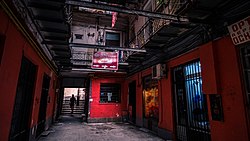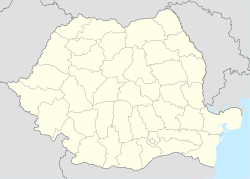English Passage
English Passage
Pasajul Englez | |
|---|---|
Passage | |
 The English Passage in 2017 | |
| Coordinates: 44°26′13″N 26°05′55″E / 44.43683°N 26.098504°E | |
| Country | Romania |
| City | Bucharest |
The English Passage (Romanian: Pasajul Englez) is a passage in the centre of Bucharest, Romania. The passage lies between the Calea Victoriei and the Strada Academiei.
Origins
[edit]In 1855, the jeweller Joseph Resch, who had arrived from Vienna in 1837, had a house built in the heart of Bucharest. The house, designed by architect Ernst Wolsch, was located on the Calea Victoriei in front of the area where the National Theatre would later be built.[1] The house was described as "imposing" was 3 stories and a clock tower on the roof.[2]
History
[edit]The house was sold in 1885 to Grigore Eliade, the son of a wealthy innkeeper, who turned it into the "English Hotel" (Hotelul English). The furniture and fittings for the hotel were imported from London.[1] During the conversion, the passage was constructed from Calea Victoriei to Academiei Street. The passage, was built along the lines of other passages that were fashionable in the capitals of Western Europe at the time. The passage is high (the building having a ground floor and three upper floors) but narrow and covered with a glass roof on a metal frame. Most of the hotel rooms were located along the passage. On both sides of the passage, there are metal balconies with windows behind.[3]
The building retained its function as a hotel for only a few years. The rooms were too small to withstand the competition from other newer hotels and was turned into a luxury brothel.[3] The windows on the upstairs balconies were suitable for women of the night to show themselves to the clientele passing through the passage.[4] The passage allowed a more discreet access for customers who preferred not to be seen on Calea Victoriei entering a house of disrepute. In his youth, Panait Istrati worked there for a while as a valet (around 1904). Among the famous clients of the brothel were King Carol II and the writer Alexandru Paleologu. The brothel functioned until 1947 when it was closed by the communist authorities, who banned prostitution.[3] The atmosphere of the place served as inspiration to Mateiu Caragiale for Craii de Curtea-Veche.[citation needed]
The building was then converted into apartments.[3]
Modern times
[edit]The passage is difficult to find because the entrances are just two meters high. The passage is neglected and the metal balconies are rusty.[1][3] The upper floors of the building are used for social housing[5] with a few shops and workshops on the ground floor.[1][3]
There have been proposals to refurbish and redevelop the passage.[6]
Film location
[edit]The English Passage has been used for various films, including Nest of Wasps directed by Horea Popescu and Dracula II: Ascension directed by Patrick Lussier.[citation needed]
References
[edit]- ^ a b c d Stan, Simina (26 February 2009). "Pasajul Englez de pe Calea Victoriei" [The English passage on Calea Victoriei]. jurnalul.antena3.ro (in Romanian). Retrieved 8 July 2020.
- ^ Mucenic, Cezara (1997). București: un veac de arhitectură civilă : secolul al XIX-lea [Bucharest. A century of civil architecture. The 19th century"] (in Romanian). Silex. ISBN 978-973-97927-6-9.
- ^ a b c d e f Gafencu, Mihai (14 March 2013). "Pasajul Englez". ziarulzidul.ro (in Romanian). Archived from the original on 4 March 2016. Retrieved 8 July 2020.
- ^ "Pasaje vechi, pasaje noi in Capitala :: Arhitectura IoanCO :: proiectare, casa, vila, arhitectura, dictionar, stiri" [Old passages, new passages in the Capital]. www.ioanco.ro (in Romanian). 3 January 2007. Archived from the original on 27 September 2007. Retrieved 8 July 2020.
- ^ "Bucharest's Beautiful Abandoned Buildings". While I'm Young. 12 June 2017. Retrieved 8 July 2020.
- ^ Otilia, Hodina Maria (18 February 2011). "Rehabilitation of English Passage, Bucharest, Romania". www.behance.net. Retrieved 8 July 2020.


